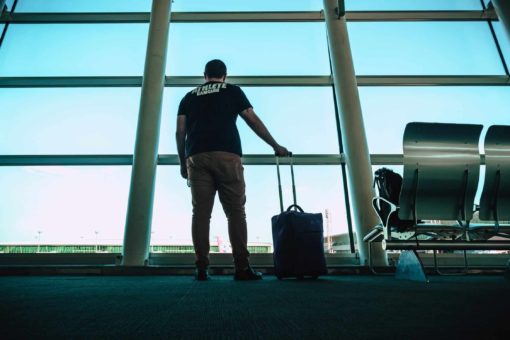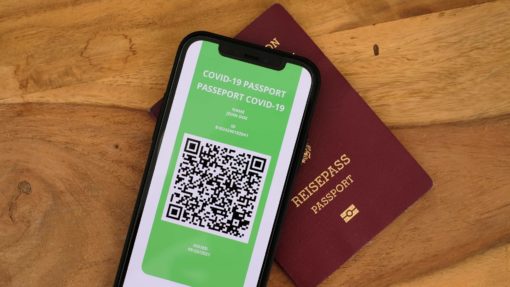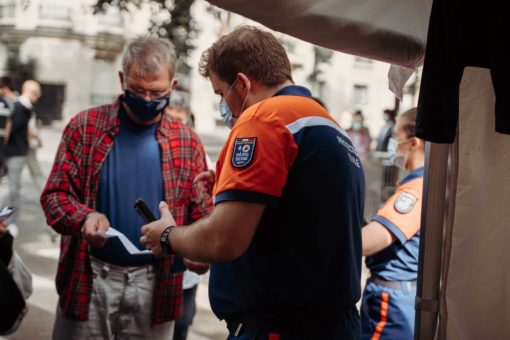Update: As of August 1, 2022, the Covid-19 certificate is no longer required for entry into France. You can find more details on the official website of the French Ministry for Europe and Foreign Affairs.
France has reopened to visitors over summer 2020, although the French Government has put the country back into lockdown twice since then.
Despite the stringent restrictions, France’s beautiful destinations and must-see places are still attracting many international tourists.
From the historic boulevards of Paris to the fashionable seaside resorts of the French Riviera and the vineyards of Provence, France remains one of the world’s top tourist destinations.
If you have your heart set on visiting the gorgeous Eiffel Tower, fairy-tale castles, and picture-perfect villages, here’s everything you need to know about travelling to France during the COVID-19 pandemic.
Table of contents:
1.Travelling to France during COVID-19: The basics
2. France: COVID-19 travel rules and entry requirements
2.2. If you are not vaccinated
3. How to use the COVID-19 digital green certificate in France
4. What happens if you test positive for COVID-19 while visiting France?
1. Travelling to France During COVID-19: The Basics

Due to the ongoing pandemic, many travellers are confused by inconsistent COVID-19 travel requirements across the Schengen Member States.
Each European country has been updating its requirements since 2020, making travel rules uneven and inconsistent.
If you’re hesitant to consider Europe as a destination right now due to the uneven patchwork of COVID-19 national border restrictions, let Visas Association give you a helping hand.
This post will provide you with comprehensive information concerning the travel restrictions currently in place in France.
Before applying for a Schengen Visa for France, please consider that:
- France’s travel restrictions are not the same as the travel restrictions currently in place in other Schengen countries. You have a duty to familiarise yourself with the amendments applicable in the European countries you will be visiting.
- When submitting your Schengen Visa application, the Embassy or Consulate may require you to show proof of your COVID-19 digital certificate (of full vaccination or previous infection).
- Regardless of the travel restrictions imposed to contain the spread of the pandemic, the usual travel restrictions apply (Schengen Visa requirements, duration of stay, etc.).
With that in mind, let’s take a closer look at the entry requirements for travellers who want to visit France.
2. France: COVID-19 Travel Rules and Entry Requirements

If you plan on visiting France, travel restrictions are based on your vaccination status.
If you are fully vaccinated, you’re free to travel to France without being subject to any restrictions related to your health conditions. If you’re travelling with children, this rule applies to them as well, regardless of their vaccination status.
For example, if you are fully vaccinated and travel with unvaccinated minor children, they will not need to self-isolate when entering France. However, please note that unvaccinated children aged 12 and over must present a negative swab test result as described below.
If you were vaccinated abroad, the Ministry for Europe and Foreign Affairs set up a specific system for issuing a COVID-19 vaccine certificate of equivalence so you can use it in France (for further details, please visit this website).
2.1. If You Are Vaccinated
If you have received a COVID-19 jab and want to enter France, you must:
- Show valid proof of vaccination, i.e.:
- Seven days after the second shot for two-shot vaccines (Pfizer BioNTech, Moderna, and AstraZeneca/Oxford)
- Four weeks after the shot for one-shot vaccines (Johnson & Johnson/Janssen)
- If you have already had COVID-19, seven days after the shot (one vaccine dose is enough if you’ve had COVID-19)
- If you have received two shots of a vaccine on the WHO lists of additional COVID-19 vaccines for emergency use (Sinovac/CoronaVac or Sinopharm/BBIB-PVeroCells) – Seven days after a booster ARNm dose (Moderna or Pfizer)
- Present a sworn declaration (you can download it here), stating that you have no symptoms of COVID-19 infection and, to your knowledge, you have not been in contact with a confirmed case of COVID-19 in the 14 days prior to entering France.
2.2. If You Are Not Vaccinated
1. If you are not vaccinated and arrive from a “green” country, i.e.:
countries in the European space (European Union, Andorra, the Holy See, Iceland, Liechtenstein, Monaco, Norway, San Marino and Switzerland), and Argentina, Australia, Bahrein, Canada, Chili, Hong-Kong, Japan, Jordan, Kuwait, Lebanon, New Zealand, Qatar, Rwanda, Saudi Arabia, Senegal, South Korea, Taïwan, Union of Comoros, United Arab Emirates, Uruguay and Vanuatu
you must:
- Present a sworn declaration (you can download it here), stating that you have no symptoms of COVID-19 infection and, to your knowledge, you have not been in contact with a confirmed case of COVID-19 in the 14 days prior to entering France.
- Present a negative PCR or antigenic test taken less than 72 hours prior to your flight (if you are aged 12 and over). If you are travelling from Romania, you must take the test less than 24 hours before the flight.
or (instead of a negative test result)
- Provide a certificate of recovery from COVID-19. The certificate must be dated more than 11 days and less than 6 months prior to the date of arrival.
Please note that this rule is not applicable if you have reasons for emergency travel or enter France for work purposes. In that case, you must provide a document showing the reasons for your trip.
2. If you are not vaccinated and arrive from an “orange” country, i.e.:
every country in the world, except those on the green and red list.
you must:
- Travel to France only for imperative reasons (please check out the French Ministry of the Interior official website to read the list of compelling reasons for travelling from an orange list country if unvaccinated).
- Present a sworn declaration (you can download it here), stating that you have no symptoms of COVID-19 infection and, to your knowledge, you have not been in contact with a confirmed case of COVID-19 in the 14 days prior to entering France. The declaration must also state that you pledge to self-isolate for 7 days and agree to be subject to a COVID-19 test (you may be subject to a random COVID-19 test when entering France).
- Submit an exempted international travel certificate for Metropolitan France (you can download it from the Interior Ministry’s website).
- Present a negative PCR test taken less than 72 hours before your flight or a negative antigenic test taken less than 48 hours before departure. If you are travelling from the United Kingdom, you must take the PCR or antigenic test less than 24 hours before boarding.
or (instead of a negative test result)
- Provide a certificate of recovery from COVID-19. The certificate must be dated more than 11 days and less than 6 months prior to the date of arrival.
When entering France, you may be subject to a random COVID-19 test. You must also pledge to self-isolate for 7 days.
3. If you are not vaccinated and arrive from a “red” country, i.e.:
Afghanistan, Brazil, Costa-Rica, Cuba, Georgia, Moldavia, Montenegro, Pakistan, Russia, Serbia, Suriname and Turkey
you must:
- Travel to France only for imperative reasons (please check out the French Ministry of the Interior official website to read the list of compelling reasons for travelling from a red list country if unvaccinated).
- Present a sworn declaration (you can download it here), stating that you have no symptoms of COVID-19 infection and, to your knowledge, you have not been in contact with a confirmed case of COVID-19 in the 14 days prior to entering France. The declaration must also state that you agree to be subject to a virological RT-PCR test for SARS-CoV-2 upon arrival and are aware that you will have to quarantine for 10 days.
- Submit an exempted international travel certificate for Metropolitan France (you can download it from the Interior Ministry’s website).
- Show proof of the location of self-isolation and potentially the access details for the authorities to carry out checks.
- Present a negative PCR or antigenic test taken less than 48 hours before the flight.
or (instead of a negative test result)
- Provide a certificate of recovery from COVID-19. The certificate must be dated more than 11 days and less than 6 months prior to the date of arrival.
When entering France, you will be tested and be subject to a mandatory 10-day quarantine supervised by security forces.
3. How to Use the COVID-19 Digital Green Certificate in France

France deployed the COVID-19 certificate (Pass Sanitaire) on June 9, 2021.
The COVID-19 certificate is required to major individuals (18+) when accessing specific places, such as:
- Cinemas, theatres, museums, places of culture, etc.
- Cafés, bars, restaurants, etc.
- Hospitals and care places (except in case of emergency)
- Trains, planes, coaches for long-distance travels
- Major Shopping centres
In case you are applying for a Schengen Student Visa, please note that the COVID-19 certificate is not required in higher education institutions for study purposes.
4. What Happens If You Test Positive for COVID-19 While Visiting France?

If you develop COVID-19 symptoms while on holiday in France, arrange to take a test at a nearby testing centre as soon as possible (please check out the map of COVID-19 test centres in France).
To encourage travellers to be tested as quickly as possible, France has put in place more testing centres for COVID-19 at several tourist hotspots, including picnic areas and train stations.
If you test positive for COVID-19 while on holiday in France, you should stay at home (or your hotel, Airbnb, etc.) and avoid interacting with people for at least 10 days after experiencing the first symptoms. If you need to contact a local doctor, you may call 09 72 72 99 09 for help in finding one.
If your symptoms get worse, call 15 from any phone (the emergency medical line). The SAMU (Service d’Aide Médicale Urgente) is France’s national emergency medical service, providing ambulances and teams of specialists.
Conclusion: France is home to some of the most beautiful cities, countrysides, and top destinations worth visiting despite the pandemic. COVID-19 is still a threat, but it is possible to travel internationally and visit them with a little bit of planning and patience.
Please note that the green, orange, and red lists of countries may change depending on how the global epidemic evolves, so make sure you stay informed about the latest changes by accessing the official website of the French Ministry of the Interior.
If you have your heart set on travelling to Europe but find the Schengen Visa application process complicated, do not hesitate to contact us. Our Visa Experts will review your exact situation and provide you with a custom and personalised “Schengen Visa Application Plan” (SVAP) for as little as $7 (the cost of a bus ticket in Europe). Apply for your Schengen Visa without frustration, confusion or wasting time and hit up Europe’s most beautiful cities!
